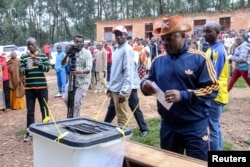The U.N. Commission of Inquiry on Burundi has accused that country's government and members of its allied youth league of gross violations of human rights, which it says in some cases might constitute crimes against humanity.
In its new 250-page report, the Commission of Inquiry on Burundi documents summary executions, arbitrary arrests, forced disappearances, acts of torture, and sexual violence among other forms of abuse.
Commission member Francoise Hampson says it is hard to get accurate figures on the extent of violations being committed because efforts often are taken to make crimes less visible.
For instance, she says, the bodies of people killed in summary executions are often disposed of at night, and are difficult to find.
“We know that the form of executions has changed. So, they are hiding the bodies. But, what we do not know is if there are more people that are disappearing than were disappearing than before. But, we do not know if they are ending up dead. There is every reason to believe that in a large number of cases they are ending up dead,” says Hampson.
Burundi has been in turmoil since 2015, when President Pierre Nkurunziza ran for and won a controversial third term.
The report finds the youth militia, the Imbonerakure, have become more repressive and are operating with almost total impunity. It says the group harasses and intimidates the population with the approval and effective control of the ruling party and the government.
Inquiry commission president Doudou Diene says the constitutional referendum organized in May and the campaign for the upcoming elections in 2020 have triggered acts of persecution, threats and intimidation.
He says serious human rights violations always increase during election campaigns. He says it is important for the international community to be exceptionally vigilant during this period, not only in monitoring the proceedings, but in preventing abuse from occurring.
The Burundian government has not responded to the report. It did not cooperate with the commission’s investigation and has, in the past, disparaged its work.
In June, Burundi’s ambassador to the United Nations in Geneva poured scorn on the previous commission report, calling it politically biased and based on a campaign of disinformation.










